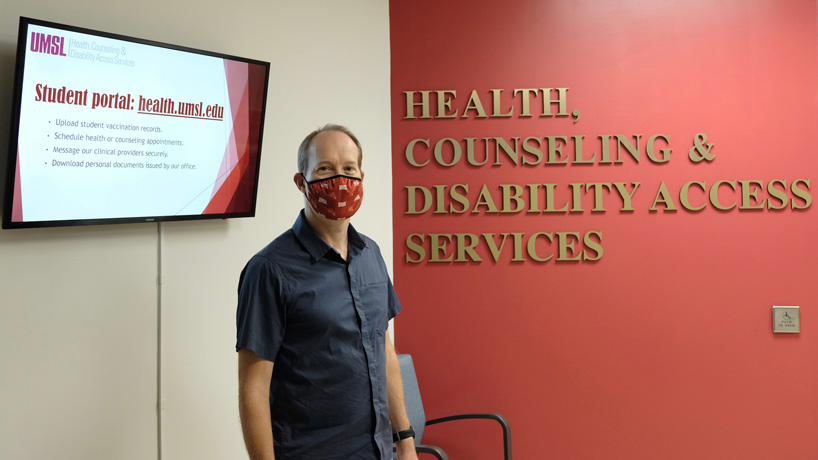
Chris Sullivan, the director of Health, Counseling and Disability Access Services, stresses the importance of people wearing face masks, social distancing and washing their hands frequently to protect the health and safety of themselves and others as UMSL reopens for the fall semester. (Photo by August Jennewein)
Chris Sullivan serves as the director of Health, Counseling and Disability Access Services at the University of Missouri–St. Louis and, for the past five months, has been a member of the eight-person unified command team helping guide the campus during the COVID-19 pandemic.
Lately, he’s helped established protocols for the safe return of students, faculty and staff to campus for the start of the fall semester with a mix of blended and online courses.
UMSL Daily spoke to Sullivan about the precautions members of the campus community should be taking to protect themselves and each other when the semester begins next Monday.
What are the biggest health-related protocols that people need to be aware of before they begin the new semester next week?
It’s all the things that people have been hearing throughout these last month. It’s the 6 feet of physical distancing, wearing face coverings, washing your hands, monitoring your health and avoiding groups. They’ll see reminders of those things on signs around campus.
This requires people doing their part, right? Why is it so important that people follow these protocols?
The important piece about this is really looking out after each other. We all have this responsibility to take care of each other. Getting sick isn’t just about me getting sick. It’s also about possibly spreading this to somebody else. The difficult thing about the virus is that it goes from people who don’t even know they’ve got it, you know, asymptomatic cases, to people dying with it. We have that range of how people are responding. It’s important for us to be taking care of each other and looking out for each other. So wearing the mask is about taking care of the people that are around me as well as protecting myself.
Another big part of this is going to be people staying at home when they’re sick. That’s not just because of COVID. Of course, COVID is the primary concern, but I think we also need to acknowledge this is not a good time to get sick with anything because we have health resources that are being stretched thin.
Do you think the campus community is bought into this?
I think we’ve all pulled together. My experience of this has been that we’ve really all been looking out for each other, working hard to have campus continue to function in spite of these difficulties. Faculty members have done a fantastic job getting classes together in a quick period of time. In student services, people are working hard and taking this seriously and doing the best we can with it. This is what UMSL does, right? We do the best we can and come up with some solutions.
Isn’t it true in this situation that we all have to accept some level of risk when engaging with other people?
Absolutely. It’s the same thing as when you’re deciding, do you go out for dinner or do you get takeout? Do you go to the grocery store or do you do food delivery? Do you seal yourself in your house and live on the canned food that you’ve got in the basement? At this point, it’s about how you make those choices.
I think we’ve helped a lot with that by having 60 percent of our classes online. I think the whole academic offering pieces allowed for a lot of different options.
But, ultimately, you have to consider what is your personal health status? What environment are you going into or whatever considerations you have for people in your house. This is about determining what is an acceptable level of risk, and we hope people are mindful of that.
Recognizing that UMSL doesn’t operate in a bubble and that what is happening across the St. Louis region is beyond any individual’s control, are you confident that the university is doing what it can to protect the campus community?
Yes, we’ve done the best we can with the community in which we’re located. I think we’ve done the best we can to continue to provide a high quality educational experience and done the best we can to promote a sense of community, which is incredibly challenging at a time when you can’t physically come together in large groups or even in small groups. As a campus, we’ve been very thoughtful and very careful about how we can do this with these current limitations.
We will all have to continue to be diligent. Regardless of what our intentions are on campus, it’s going to be a function of what happens in the larger community as well.














